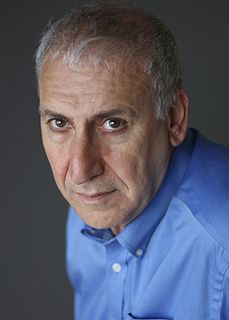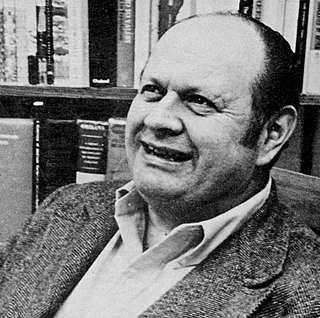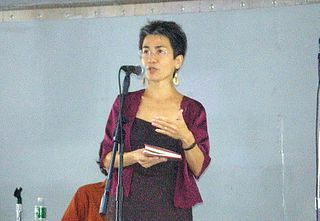
The Pulitzer Prize for Poetry is one of the seven American Pulitzer Prizes awarded annually for Letters, Drama, and Music. It was first presented in 1922, and is given for a distinguished volume of original verse by an American author, published during the preceding calendar year.

Saginaw County, officially the County of Saginaw, is a county located in the U.S. state of Michigan. As of the 2010 census, the population was 200,169. The county seat is Saginaw. The county was created by September 10, 1822, and was fully organized on February 9, 1835. The etymology of the county's name is uncertain. It may be derived from Sace-nong or Sak-e-nong, as the Sauk tribe is believed by some to have once lived there. A more likely possibility is that it comes from Ojibwe words meaning "place of the outlet" –sag and ong. See List of Michigan county name etymologies.

Theodore Huebner Roethke was an American poet. He is regarded as one of the most accomplished and influential poets of his generation, having won the Pulitzer Prize for poetry in 1954 for his book The Waking, and the annual National Book Award for Poetry on two occasions: in 1959 for Words for the Wind, and posthumously in 1965 for The Far Field. His work was characterized by its introspection, rhythm and natural imagery.
The Bollingen Prize for Poetry is a literary honor bestowed on an American poet in recognition of the best book of new verse within the last two years, or for lifetime achievement. It is awarded every two years by the Beinecke Rare Book and Manuscript Library of Yale University.

Frank Bidart is an American academic and poet, and a winner of the Pulitzer Prize for Poetry.

Edward M. Hirsch is an American poet and critic who wrote a national bestseller about reading poetry. He has published nine books of poems, including The Living Fire: New and Selected Poems (2010), which brings together thirty-five years of work, and Gabriel: A Poem (2014), a book-length elegy for his son that The New Yorker called "a masterpiece of sorrow." He has also published five prose books about poetry. He is president of the John Simon Guggenheim Memorial Foundation in New York City.

Richard Hugo, born Richard Franklin Hogan, was an American poet. Although some critics regard Hugo as primarily a regionalist, his work resonates broadly across place and time. A portion of Hugo's work reflects the economic depression of the Northwestern United States, particularly Montana. Born in the White Center area of Seattle, Washington, he was raised by his mother's parents after his father left the family. In 1942 he legally changed his name to Richard Hugo, taking his stepfather's surname. He served in World War II as a bombardier in the Mediterranean. He left the service in 1945 after flying 35 combat missions and reaching the rank of first lieutenant. Hugo's experiences in the military are referenced in one of his books of poetry, Good Luck in Cracked Italian.

Kimiko Hahn is an American poet and distinguished professor in the MFA program of Queens College, CUNY. Her works frequently deal with the reinvention of poetic forms and the intersecting of conflicting identities.

Peter Balakian is an Armenian American poet, writer and academic, the Donald M. and Constance H. Rebar Professor of Humanities at Colgate University. He was awarded the Pulitzer Prize for Poetry in 2016.

Nelson Bentley (1918–1990) was an American poet and professor at the University of Washington in Seattle. He was born in Elm, Michigan. He graduated from the University of Michigan, receiving his bachelor's and then his master's degree from that university.
Poetry Northwest was founded as a quarterly, poetry-only journal in 1959 by Errol Pritchard, with Carolyn Kizer, Richard Hugo, Edith Shiffert and Nelson Bentley as co-editors. The first issue was 32 pages and included the work of Richmond Lattimore, May Swenson, Philip Larkin, James Wright, and William Stafford.
The Shelley Memorial Award of the Poetry Society of America, was established by the will of Mary P. Sears, and named after the poet Percy Bysshe Shelley. The prize is given to a living American poet selected with reference to genius and need, and is currently worth (2014) between $6,000 and $9,000. The selection is made by a jury of three poets: one each appointed by the presidents of Radcliffe and Berkeley, and the third by the Board of Governors of the Society.

Carolyn Ashley Kizer was an American poet of the Pacific Northwest whose works reflect her feminism. She won the Pulitzer Prize in 1985.
Milton Kessler (1930-2000) was a poet and academic who spent most of his career at Binghamton University. He was one of the founders of the institution's creative writing program.
David Russell Wagoner is an American poet who has written many poetry collections and ten novels. Two of his books have been nominated for National Book Awards.
Sherod Santos is an American poet, essayist, translator and playwright. His newest poetry collection, Square Inch Hours was published in 2017. His work has appeared in The New Yorker, The Paris Review, The Nation, Poetry, The Royal Court Theatre, Proscenium Theatre Journal, American Poetry Review, and The New York Times Book Review. His plays have been produced at the Algonquin Theatre in New York City, The Side Project in Chicago, the Brooklyn International Theatre Festival, and the Flint Michigan Play Festival. He wrote the settings for the Sappho poems in the CD Magus Insipiens, composed by Paul Sanchez and sung by soprano Kayleen Sanchez.
Duane Niatum (McGinniss) is a Native American poet, author and playwright from the Jamestown S'Klallam Tribe in the northern Olympic Peninsula of the state of Washington. Niatum's work draws inspiration from all aspects of life ranging from nature, art, Native American history and humans rights. Niatum is often cited as belonging to the second wave of what critic Kenneth Lincoln has termed the Native American Renaissance.
Greg Kuzma, is an American poet, essayist, poetry reviewer, and editor, who has written and published more than 30 books. Mostly in the 1970s, more than 300 of his poems were published in the nation's most prestigious journals. At that time, he founded the Best Cellar Press, under which he produced handset letterpress chapbooks giving other poets who have become some of America's best known poets an early audience, including U.S. Poet Laureate Ted Kooser, Albert Goldbarth, Wendell Berry, Alfred Starr Hamilton and Richard Shelton. The Best Cellar Press was the inspiration for the current Backwaters Press in Omaha. In the 1970s, Kuzma also founded the pioneering and influential literary magazine, Pebble. As an author, he has been largely collected by libraries worldwide.
David Pearson Etter was an American poet. He was known for poems evoking small-town midwestern life. His most famous volume was written as 222 monologues in the voices of citizens of the imaginary community of “Alliance, Illinois,” which was based in part on his experiences living for many years in his adopted hometown of Elburn, Illinois.
"Root Cellar" is a poem written by the American poet Theodore Roethke (1908-1963) published in Roethke's second collection, The Lost Son and Other Poems, in 1948 in Garden City, New York. The poem belongs among Roethke's series of "Greenhouse Poems" the first section of The Lost Son, a sequence hailed as "one of the permanent achievements of modern poetry" and marked as the point of Roethke's metamorphosis from a minor poet into one of "the first importance", into the poet James Dickey would regard among the greatest of any in American history.









